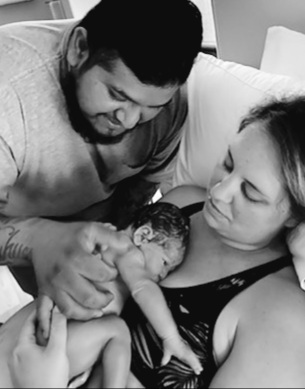We may earn money or products from the companies mentioned in this post.
Recognizing the importance of postpartum health is crucial for parents. While the joy of welcoming a newborn is unparalleled, the period after childbirth can bring about a mix of emotions, from happiness to worry. Some mothers may face challenges like postpartum PTSD, which can arise due to changes in past traumas or the stresses of adjusting to motherhood.
Furthermore, the process of recovery from childbirth can intersect with well-being. It’s important to understand that each mother’s journey is unique. With knowledge, preparation, and open communication with healthcare professionals, parents can effectively anticipate, address, and navigate these challenges. This will help ensure a transition into this phase of life.
What is Postpartum PTSD
Post Traumatic Stress Disorder (PTSD) is a mental health condition triggered by witnessing or experiencing a traumatic event. When this disorder occurs after giving birth, it is known as postpartum PTSD. It’s essential to distinguish this condition from postpartum depression.
Defining the Challenge
Postpartum manifests as an enduring re-experiencing of birth events often accompanied by intrusive memories, nightmares, or flashbacks. It is different from postpartum depression, which typically involves periods of feeling a profound lack of interest in daily activities following childbirth.
Exploring Causes and Risk Factors
Several factors can contribute to the development of postpartum PTSD. Unexpected medical complications during labor and delivery can act as triggers. A planned birthing experience can be disrupted by medical emergencies resulting in emotional distress.
Previous experiences of trauma can worsen the impact of any childbirth experience. Past traumatic events can intensify the effects of recent concussions.
The importance of an environment should not be underestimated. Insufficient support during and after childbirth can make mothers more susceptible to PTSD. Additionally, personal predispositions may affect one’s vulnerability, whether influenced by history or genetic factors.
Resources for Understanding PTSD
For those interested in gaining a deeper understanding of PTSD beyond the context of postpartum experiences, the website https://www.warriorsheart.com/ptsd/ provides valuable insights and resources. Such platforms offer a perspective on PTSD, including its causes and potential treatments. They serve as resources for individuals seeking knowledge on this subject.
What To Do Before Giving Birth
Before giving birth, educating yourself and preparing for the experience is essential. Here are some steps you can take:
Gain Knowledge and Get Ready
Take the time to learn about childbirth and what to expect. Understanding the stages and potential complications can help alleviate anxiety and make you feel more prepared. Attend classes or workshops that provide information on aspects of childbirth, such as breathing techniques, pain management options, and postpartum care. Talk to mothers and join support groups where you can gather insights, advice, and emotional support.
Create a Supportive Environment
Surround yourself with a support system of family members, friends, or partners who can offer assistance before, during, and after childbirth. Communicate your needs with your loved ones so they understand how best to support you. Consider involving experts like doulas or counselors who can provide support and guidance.
Prioritize Self-Care
Take care of your mental well-being by engaging in activities that promote relaxation and stress reduction. Practice self-care techniques, like meditation, deep breathing exercises, or gentle exercise routines tailored for pregnancy.
Regular consultations with therapists or counselors can assist in navigating any challenges and setting a course forward. Remember that each person’s experience is unique, so listening to your body and prioritizing what feels suitable for you throughout this preparation journey is essential.
Create a Birth Plan
While knowing how the childbirth process might unfold is beneficial, also remaining open-minded about changes is equally important.
What To Do After Giving Birth
The journey doesn’t end with childbirth. It’s a time of healing, adjustment, and personal growth. Here are some steps to take after giving birth:
Reflecting on the Experience
Mothers need to process their birthing experiences. Conversating about the process with someone they trust can bring clarity and emotional relief. Understanding that things may sometimes go differently than planned is crucial. Addressing any events or complications makes healing and making sense of the experience more accessible.
Seeking Ongoing Support
The postpartum period can be challenging, highlighting the need for support. Connecting with parents in postpartum groups allows for shared experiences and mutual understanding. Regular check-ins with healthcare professionals ensure both physical and mental well-being. Taking advantage of support networks is a way to prioritize postpartum health.
Taking Care of Oneself
Finding a balance between being a mother and caring for oneself is crucial. Ge is crucialtting rest can have an impact on overall well-being. Engaging in activities that help rejuvenate, whether hobbies or simple relaxation techniques, can be beneficial if you face challenges; seeking assistance to address potential issues is recommended.
Being Mindful of Changes and Recovery
Pregnancy and childbirth bring about changes in the body, and the postpartum period is a time for healing and adjustment. Mothers need to pay attention to their bodies during this phase. This includes keeping an eye out for any changes, wounds, or discomfort that may arise.
Consulting healthcare professionals regarding recovery can guide healing timelines, potential complications, and interventions that promote recovery. Understanding and tending to the body’s needs can contribute to postpartum health and well-being.
Recognizing Signs that Professional Help May Be Needed
It is crucial to recognize and address signs of postpartum challenges promptly. Distinguishing between common postpartum fatigue and severe symptoms is essential. Trusting your instincts and acknowledging concerns is the step towards seeking assistance.
Some signs to look out for include:
- Feeling Sad or Hopeless: It’s not uncommon to go through mood swings after giving birth. If you find yourself experiencing deep sadness or despair that lasts for weeks, it might be a sign of postpartum depression.
- Feeling Overwhelmed by Anxiety or Having Panic Attacks: If you constantly worry about your baby’s health or have doubts about your abilities as a mother, and symptoms like heart palpi accompany the stations, it could indicate postpartum anxiety.
- Having Flashbacks or Reliving the Birth Experience: Experiencing recurring and intrusive memories of childbirth can be a sign of traumatic stress disorder.
- Withdrawing from Loved Ones: Avoiding interactions with close family members and friends can be a warning sign.
- Changes in Appetite and Sleep Patterns: It’s normal for appetite and sleep patterns to change after giving birth. If there are drastic alterations or persistent insomnia, it may require professional attention.
- Thoughts of Harming Yourself or the Baby: If you have any thoughts of harming yourself or the baby, even if they are fleeting, it is crucial to address them with a healthcare professional.
Recognizing these signs and seeking help from professionals can contribute to a more positive postpartum experience that ensures the well-being of both the mother and the baby.
Valuable Tips for Mom’s Coping with Postpartum Depression
Postpartum depression (PPD) is a concern that affects new mothers. Addressing this issue is essential by discussing self-care strategies designed for moms with postpartum depression.
Establishing a Regular Routine
Creating a routine can bring a sense of normalcy. This can involve scheduling times for meals, naps, and relaxation. Having predictability in your day can be comforting during periods of turbulence.
Embrace Mindfulness and Meditation
Engaging in mindfulness exercises or meditation can be highly beneficial. These practices promote being present in the moment and aid in managing emotions.
Seek Support from Others
Isolation can worsen feelings of depression. Connecting with friends and family or joining support groups specifically designed for mothers experiencing PPD is crucial. These connections offer relief and practical guidance.
Resources for Understanding Postpartum Depression
To better support mothers on their journey, it is helpful to explore materials that focus specifically on postpartum depression. This comprehensive guide provides advice, insights, and coping strategies tailored to mothers facing the challenges of PPD.
The Importance of Partners in Postpartum Recovery
Partners play a role in supporting mothers during the postpartum period. Their involvement can span from assisting with household tasks to being a listening ear when emotions are high. Emotional and practical support from partners can significantly ease the challenges of this transition, creating a nurturing environment for both the mother and the newborn.
The Physical Recovery Process and Its Impact on Mental Health
The recovery after giving birth is often overlooked when discussing postpartum health, which is closely linked with well-being. Addressing postpartum pain, fatigue, and hormonal changes can profoundly affect a mother’s state. New mothers must consult healthcare professionals about any discomforts as they could indirectly contribute to postpartum PTSD.
The Influence of Societal Expectations
Societal norms and expectations can unintentionally add pressure to a mother’s already challenging experiences. Recognizing that every mother’s journey is unique and reframing societal perspectives can pave the way for more genuine conversations and support surrounding postpartum health.



